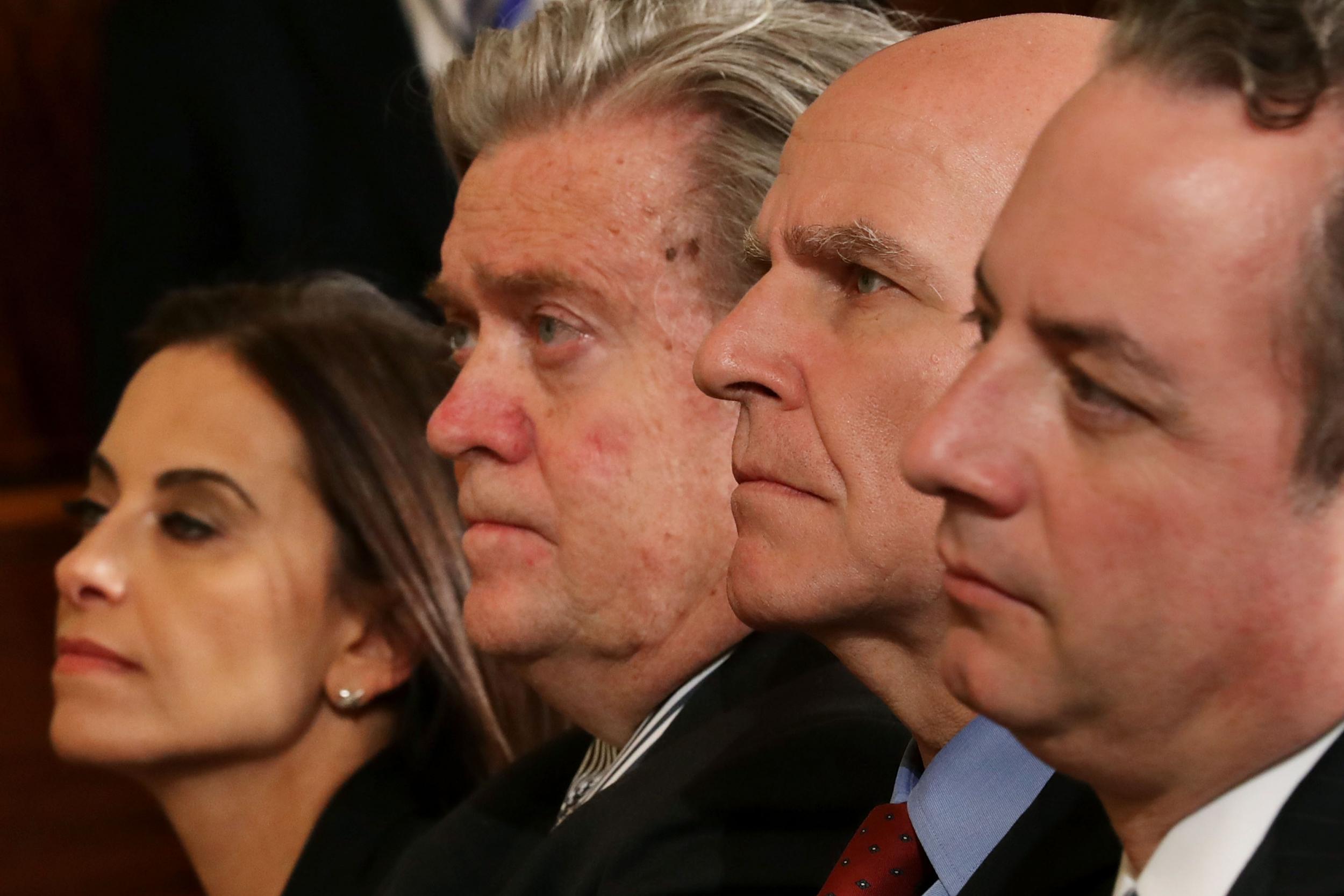Who is Steve Bannon? The far-right figurehead who just got fired by Trump
Mr Bannon has had a successful career in media and finance, and is unlikely to stay out of the spotlight for long

Steve Bannon, the eternally embattled chief strategist to President Donald Trump, has stepped down from his White House role. But if his past suggests anything, it's that he won’t be away from the limelight long.
Mr Bannon was born in Virginia in 1953, in what he has described as a “blue-collar, Irish Catholic, pro-Kennedy, pro-union family of Democrats”. He quickly evolved, however, into a key player in far-right politics – and a driving force in Mr Trump’s political rise.
The 63-year-old first entered public service as a special assistant to the chief of Naval operations at the Pentagon, earning a master’s degree at Georgetown University on the side. The career failed to entrain him for long, however, and he decided to apply to Harvard Business School.
After graduating with an MBA in 1985, Mr Bannon took a job at Goldman Sachs. He was largely successful at the investment bank, where co-workers described him as “independent minded”, with “strong points of view”. From there, he shifted to media financing, backing shows like "Seinfeld" and, later, political documentaries like “Clinton Cash” and “Border War: The Battle Over Illegal Immigration”.
It was in this line of work that Mr Bannon met Andrew Breitbart – the man who would elevate him to a national profile. Mr Breitbart was the founder and executive chairman of the ambitious conservative news site Breitbart News. When Mr Breitbart died of a heart attack in 2012, Mr Bannon took over his role.

Under Mr Bannon’s leadership, Breitbart became a bastion of the far-right – a controversial outlet that decried globalism, feminism, and the “liberal establishment” as a whole.
“We think of ourselves as virulently anti-establishment, particularly ‘anti-’ the permanent political class,” Mr Bannon once told The Washington Post. “We say Paul Ryan was grown in a petri dish at the Heritage Foundation.” (Mr Bannon has reportedly expanded on this insult in private, calling Mr Ryan a “limp-d**k motherf*****”.)
Mr Bannon’s populist, nationalist beliefs – and uncensored manner of speaking – made him a natural for the Trump campaign. Mr Bannon first met Mr Trump in 2011, when he was seriously considering a run for president. The businessman appointed him CEO of his eventual, successful presidential campaign in August of 2016.
It was then that Mr Bannon began generating negative headlines, centred mainly on his alleged anti-Semitic comments and accusations of abuse from his ex-wife. The outcry only intensified after Mr Trump appointed him White House chief strategist, in one of his first decisions as President.
“We at ADL National oppose the appt of Steve Bannon to sr role at White House bc he & his alt-right are so hostile to core American values,” tweeted Jonathan Greenblatt, CEO of the Anti-Defamation League, shortly after his appointment.
In his White House role, Mr Bannon was pivotal in developing some of the President’s most controversial policies – including the travel ban on residents of six Muslim-majority countries, and the decision to pull out of the Paris climate agreement.
Mr Bannon also stoked controversy within the White House itself, regularly cycling in and out of the President's favour and feuding with other White House appointees. In April, amid infighting between Mr Bannon and the President son-in-law, Jared Kushner, Mr Trump said: "I like Steve, but you have to remember he was not involved in my campaign until very late."
"I had already beaten all the senators and all the governors, and I didn't know Steve,” he added. “I'm my own strategist, and it wasn't like I was going to change strategies because I was facing crooked Hillary."

In the end, Mr Bannon’s critics won out. The White House announced on 18 April that the embattled strategist would be leaving his position. He had recently come under fire for allegedly spreading damaging rumours about national security adviser HR McMaster, and publicly contradicting the President’s stance on North Korea.
“White House Chief of Staff John Kelly and Steve Bannon have mutually agreed today would be Steve's last day,” the White House said in a statement. “We are grateful for his service and wish him the best.”
It is unclear whether Mr Bannon offered his own resignation, or was forced out. But a source close to Mr Bannon told Axios that he would continue aggressively advocating for Mr Trump’s agenda, and fighting his detractors.
As Matthew Boyle, Breitbart Washington political editor, once said: “If there’s an explosion or a fire somewhere, Steve’s probably nearby with some matches.”
Join our commenting forum
Join thought-provoking conversations, follow other Independent readers and see their replies
Comments
Bookmark popover
Removed from bookmarks